A recent study published in Behavioral Sciences has found that a two-week social media digital detox can significantly reduce smartphone and social media addiction while improving physical, mental and social health among young adults.
Smartphones have become an essential part of modern life, offering a range of functions from communication to entertainment. However, excessive use of these devices has been linked to several negative health impacts, including mental health issues, poor sleep, and reduced physical activity. This has led to growing interest in digital detoxes (more colloquially known as ‘unplugging’ or ‘disconnecting’), where individuals take a break from their electronic devices or social media to improve their health and well-being.
Researchers Paige Coyne from Henry Ford Health and Sarah J. Woodruff from the University of Windsor therefore set out to explore the effects of a two-week social media digital detox on young adults. The study aimed to address the limitations of previous research by using device-based/objective measures, by incorporating follow-up measurements into the study design, and also by providing a more realistic restriction of technology instead of going “cold turkey”.
The study involved 31 young adults aged 18 to 30 who were recruited from a mid-sized university in Ontario, Canada. The participants were regular social media users, spending at least one hour per day on social media applications, and used iPhones with Screen Time tracking enabled.
Participants were asked to limit their social media use to 30 minutes per day for two weeks. Coyne and Woodruff noted, “This specific time limit was implemented in hopes that it would significantly reduce participants’ social media use on their smartphones but not be so restrictive that participants would be unable to complete the intervention successfully.”
Their smartphone and social media usage were tracked using the iPhone’s iOS 12 Screen Time feature. Participants completed surveys at three different timepoints: before the detox with unrestricted social media use, during the detox with restricted social media use, and after the detox when the restriction was removed.
These surveys assessed various health-related outcomes, including smartphone and social media addiction, physical activity, sedentary behavior, sleep, eating behaviors, life satisfaction, stress, and perceived wellness.
The results were promising. On average, time spent on social media was reduced by 77.7%. Participants showed a significant reduction in both smartphone and social media addiction during the detox period.
The researchers highlighted, “comparisons of quantitative [data before and after the detox] indicate that both addiction and all the health-related outcomes studied showed positive or neutral improvement,” suggesting that the effects of the detox lasted for some time and there were no negative outcomes.
Additionally, there were notable improvements in several health-related outcomes. Sleep quality improved, with participants also reporting longer sleep duration during the detox. Life satisfaction also increased, and stress levels decreased. Interestingly however, there was no effect on levels of physical activity, sedentary behavior, or mindful eating.
The data from the interviews with the participants provided further insights. Many participants expressed feelings of relief and decreased pressure to maintain their social media presence. However, some participants did experience feelings of disconnection from friends and family.
The detox posed initial challenges but most participants eventually adapted, where “many … suggested that half an hour was a sort of manageable sweet spot, where they could still engage with social media but not get caught scrolling for hours.”
Nevertheless, despite the reduction in social media time, participants reported that their overall screen time remained high as many turned to other digital activities like gaming or entertainment apps, or increased their use of other devices such as laptops.
Coyne and Woodruff also reported that after the detox, “a great number of participants disclosed that they overindulged in social media for a short period of time” but that “many suggested that they were aware of the binging behavior they were engaging in, that it only lasted a few days, and that their overall awareness of their social media usage increased as a result of participating in a detox.”
The authors concluded on a positive note, “the participants shared many valuable suggestions for future detoxes, with particular emphasis being placed on making detoxes realistic, sustainable, and personalized to each user, where possible.”
It is worth noting that the study had some limitations. For example, the study design lacked a control group of participants who did not undergo the detox. Furthermore, there was an inability to control participants’ use of social media on other devices separate to their phone.
The study, “Taking a Break: The Effects of Partaking in a Two-Week Social Media Digital Detox on Problematic Smartphone and Social Media Use, and Other Health-Related Outcomes among Young Adults”, was authored by Paige Coyne and Sarah J. Woodruff.




